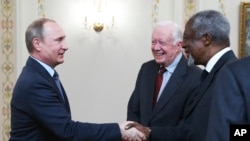Former U.S. president Jimmy Carter says he is pleased with Russia's commitment to implement the Minsk agreement.
Carter and other former global leaders met with Russian President Vladimir Putin for 2.5 hours Wednesday in Moscow. The group, called the Elders, visited at a time when Russia's relations with the West are severely strained over Moscow's seizure of Crimea and the deadly conflict in eastern Ukraine.
In an exclusive interview with VOA after meeting with President Putin, Carter said the Elders were pleased with Russia's allegiance to the Minsk agreement. “There's not any doubt in our mind that the Russians genuinely want to see all the aspects of that concluded. I think that's the only ballgame in town,” said Carter, “really as far as resolving the problems with Ukraine, is to get the Minsk agreement implemented.”
The Minsk II agreement was reached in February by France, Germany, Russia, Ukraine and pro-Russia separatists. It envisions a cease-fire and withdrawal of foreign troops and heavy weapons leading to a lasting, legal and political solution to the conflict in Ukraine. The deal is considered by many to be the last, best hope for peace in eastern Ukraine while more hawkish Western politicians are calling for arming Ukraine's military to better stand up to Russian forces backing the rebels.
The United States and its European allies have considerable doubts about Moscow's commitment to the Minsk accord. On Thursday, General Philip Breedlove, the NATO commander, testified before the U.S. Senate Armed Services Committee that Russia appears to have used the lull in fighting since the Minsk II agreement was signed in February to "reset and reposition" forces near eastern Ukraine.
Breedlove said many of Russia's actions are "consistent with preparations for another offensive" into Ukrainian territory.
While declining to weigh in on Western accusations that Russia is supplying troops and weapons to rebels in eastern Ukraine, the former U.S. president reiterated his opposition to any arms flowing into the country. “I would like very much to see a cessation of sending arms to Ukraine, either to Kyiv or to the eastern part,” said Carter. “And, my hope is that President Obama would not do so.”
Carter acknowledged Ukraine still needs Western military support in the form of "non-lethal equipment." The United States and NATO have not sent weapons to Ukraine, but sent medical supplies and other equipment, such as radios, vehicles and defensive radar systems.
The former U.S. president repeated his position that Russia’s annexation of Crimea was “inevitable” because of its Soviet Russian roots, and was what the people of Crimea wanted and would not be undone any time soon. “I don't know what initiative came from the people in Crimea and what initiative came from the people in Russia,” said Carter.
Carter originally stated that position a year ago, shortly after the annexation happened, but he also has said Russia should not be allowed any other territorial gains in Ukraine.
Commenting on Carter’s remarks, the U.S. State Department said Thursday it would not speculate on the reasoning behind his statements.
“We know that Russia has continued to undermine the Minsk implementation plan and the Minsk agreements through ongoing support and resupply of the separatists, said spokeswoman Marie Harf, speaking to reporters. “Russia and the separatists can’t pick and choose which parts of Minsk they want to implement and what not to. They signed these agreements and they must honor them, all of them.”
On Crimea, Harf said that the U.S. has been consistent about it being “part of Ukraine.”
“That is why we put sanctions on, that is why we have kept the pressure on [Russia],” added Harf.
Western leaders accuse Russia of forcing an illegal referendum in Crimea after its special forces took over Ukrainian military bases on the Black Sea peninsula. The referendum gave the Crimean people only two choices: independence or joining Russia. Crimean authorities say 97 percent of voters chose to join Russia.
Carter's visit with the Elders came as Moscow was packed with military vehicles practicing for a parade on May 9 to mark the end of World War II, known as “Victory Day” in Russia.
Leaders from Western nations, including Germany, Britain and the United States, have declined to attend the event because of Russia's actions in Ukraine. Putin has accused the U.S. of dictating to European leaders whether they can attend and treating countries like vassal states.
Carter, however, said when the Elders discussed the issue with Mr. Putin, he made no indication of concern. “The most he said was that he was sure on many of these issues there was close consultation between the United States and European countries,” said Carter. “But, I wouldn't derogate the autonomy or freedom or independence or sovereignty of any European country by maintaining that the United States could force them to go or not go to a parade. I think that's a decision that each one of them has to make.”
Carter served as president from 1977 to 1981. Since his time in office, he has traveled the world as an advocate for human rights, democracy, housing for the poor and health care.
The late Nelson Mandela of South Africa founded the Elders as a vehicle for retired national leaders to work for human rights and world peace. Among those accompanying Carter to Russia were former Finnish president Martti Ahtisaari, former U.N. secretary-general Kofi Annan, former Algerian foreign minister General Lakhdar Brahimi, former Norwegian prime minister Gro Harlem Brundtland and former Mexican president Ernesto Zedillo.




